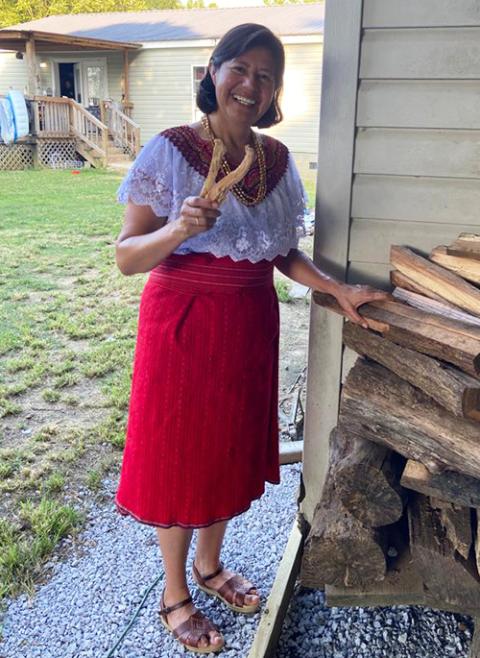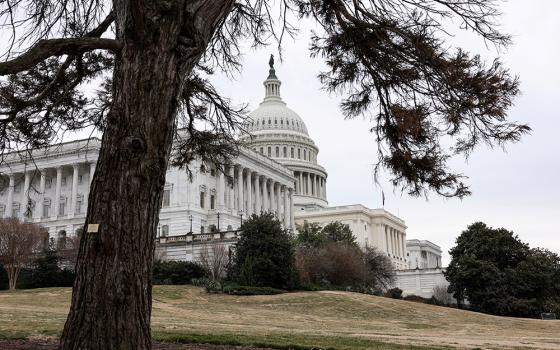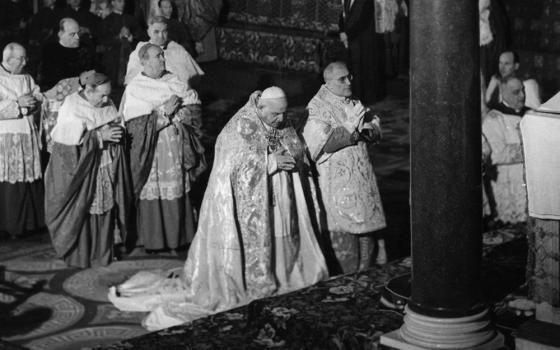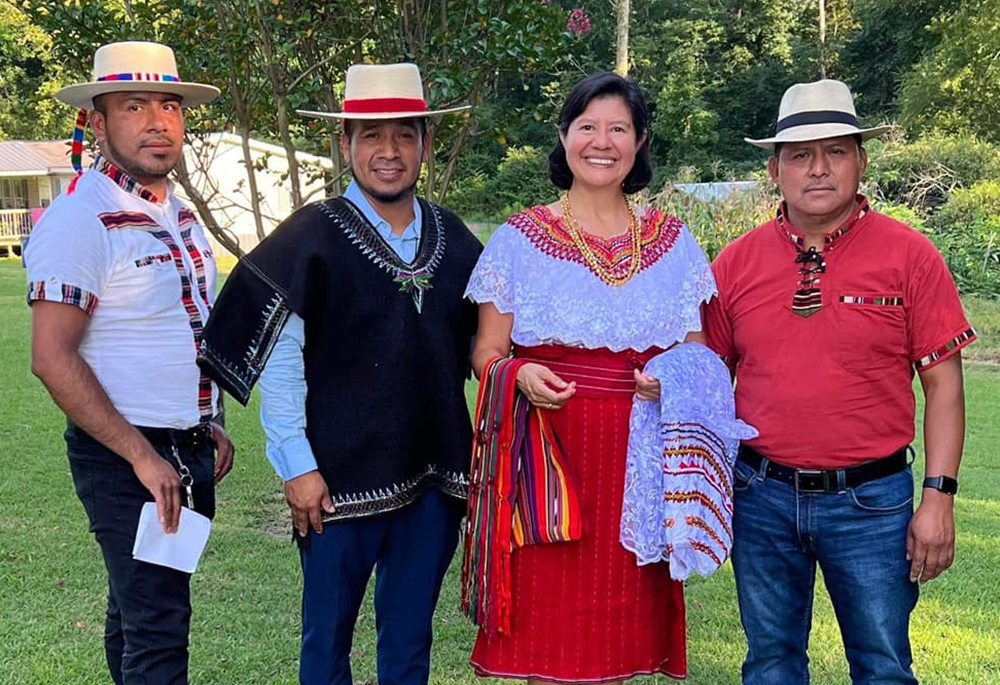
Sr. Gabriela Ramírez of the Guadalupan Missionaries of the Holy Spirit poses for a photo with men of the Mayan community in Birmingham, Alabama. (Courtesy of Gabriela Ramírez)
Sr. Gabriela Ramírez is a Guadalupan Missionary of the Holy Spirit from San Luis Potosí, the capital of San Luis Potosí state in central Mexico. For almost two decades, she has worked with Hispanic migrants in the United States, and she is currently the director of Emergency and Disaster Relief Services in the Diocese of Birmingham, Alabama, and supervises seven diocesan social service agencies, including La Casita - Guadalupan Multicultural Services.
In addition to her established pastoral work, for the past 19 years, Ramírez has had a special and personal ministry with the Indigenous Mayan communities that come from San Sebastián de Huehuetenango, Guatemala, and have settled in Alabama.
After migrating because of the lack of opportunities and poverty of their country, they have established their own communities in different parts of the United States while preserving their particular characteristics, traditions and faith, even in the face of hardship, abuse and discrimination.
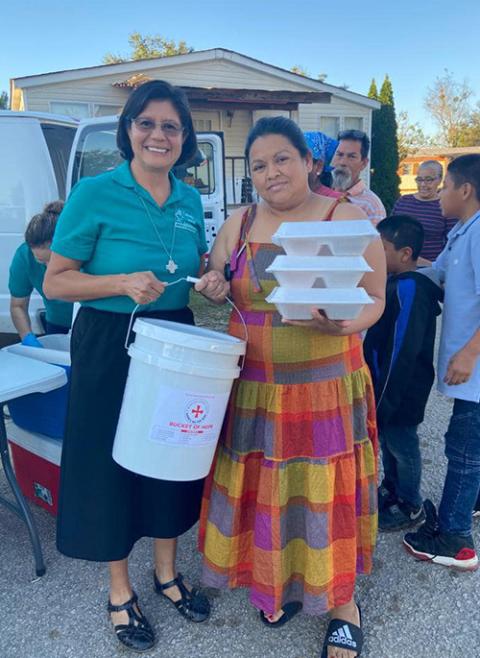
Sr. Gabriela Ramírez of the Guadalupan Missionaries of the Holy Spirit provides relief to victims of October 2021 flooding in Pelham, Alabama. (Courtesy of Gabriela Ramírez)
Ramírez says that is why this ministry is so special: The Mayans have opened the doors of their hearts to her so she can truly be a part of their home community.
GSR: How did you get to know the Mayan communities in the United States?
Ramírez: I learned a little about the Mayans and their culture before I came here, as I spent six months in Guatemala. However, my contact with them here was 19 years ago, when I worked in Hispanic ministry in Mississippi. There, I met a community leader who invited me to one of their celebrations. I loved it and continued to attend. I did that for seven years.
In 2010, I came to Alabama and, providentially, I found them again.
What are the Mayan communities in Alabama like?
I am familiar with two communities, St. Francis of Assisi and St. Sebastian Martyr, and both are in Albertville, Alabama. They each have their own chapel built by their own hands. They are beautiful, close-knit communities filled with love, respect and faith.
They are also very well-organized communities, each one with its own community leader, its catechists, its liturgy team, maintenance, etc. They are men and women who know how to dialogue and reach agreements. They are people who are proud of their roots and culture. They are communities that live simply, that value and respect nature and that thank God for what they have.
By gathering in the chapel, the Mayans reaffirm their sense of belonging and make the spaces their own with their music, their food, their clothing, their way of life.
Advertisement
Are they marginalized communities?
Unfortunately, yes. They arrive here speaking their own language — Mayan — without knowing English and some without knowing Spanish. This causes them to be discriminated against, even by Hispanics. Sometimes, the discrimination is because of their Indigenous appearance. However, they are proud of their culture.
What do the families live on?
The Mayans come here looking for work. The vast majority do manual labor in the food industries. They handle the process so that we can buy and eat chicken. It is very hard work, day and night. Some end up injured, without fingernails, and some have even gotten arthritis. These are communities that are being exploited for labor.
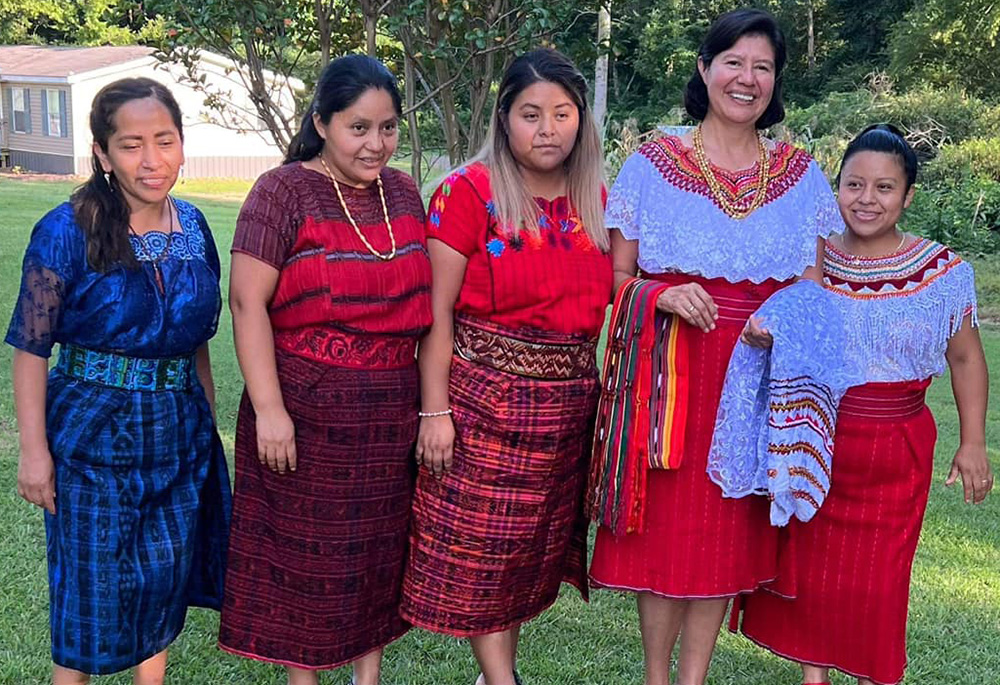
Sr. Gabriela Ramírez of the Guadalupan Missionaries of the Holy Spirit poses for a photo with women of the Mayan community in Birmingham, Alabama. (Courtesy of Gabriela Ramírez)
How do they live their faith?
The Mayans have a precious and authentic faith. They know how to pray and feel part of a [spiritual] community. For example, the liturgy is very special for them. So, although a priest comes every month to celebrate Mass, every Sunday, they have the celebration of the word in the Mayan language, presided by the leader of the community. Sometimes, I have presided.
These are beautiful moments in which you can witness their faith in gestures and actions. You can see it in the way the women incense during the liturgy or, also, in the petitions, where everyone asks God out loud. The Mayans know that God listens to them. They know they can participate because they are with family.
They also have a special love for the Virgin of Guadalupe, whom they see as one of their own.
You have been close to the Mayans for years. Could you tell us about your relationship with them?
They are people who value the heart very much. They are goodhearted people, and they know when someone else is good. I have been entering the community gradually, getting to know them, making friends, and today, they are my family.
I think they feel the same way about me because they have allowed me to wear their garments. I may wear the same clothes as them. It is a sign that I am part of the community. This makes me immensely happy. Even my own brother tells me that I am a chapina [native Guatemalan].
Do you discover God in this apostolate?
Definitely, yes. When I am with them, I see the realization of what Jesus says in the Gospel: "I give praise to you, Father, lord of heaven and earth, for although you have hidden these things from the wise and the learned, you have revealed them to the childlike" (Matthew 11:25).
There is something very precious in knowing the simplicity of the Mayans and the depth they have in discovering God. They do it, and I do it with them. With the Mayans, I have seen for myself that God is present and speaks through the simple, the poor, in one's own identity and in the love of creation. Being with them has filled me with life because I know that the Holy Spirit is there, blowing.
In this, I find a God who is alive, merciful and close to me.
What should the Catholic Church offer to the Mayan communities?
The first thing would be to value the richness and the cultural, spiritual and family contribution that they bring to the ecclesial community. It is necessary to promote and recognize them so that they feel a part of the church. For example, in the liturgy, we can integrate more of the Mayan culture, their language, their way of celebrating as necessary.
We can also offer visibility and a voice to defend their rights while at the same time working to generate opportunities for them to feel that they are the protagonists of their own destiny.
We as a church cannot neglect the opportunity to be enriched by the presence of God in these simple and culturally diverse people. This is an opportunity for synodality, namely, so that by journeying together, we can encounter the living God.

